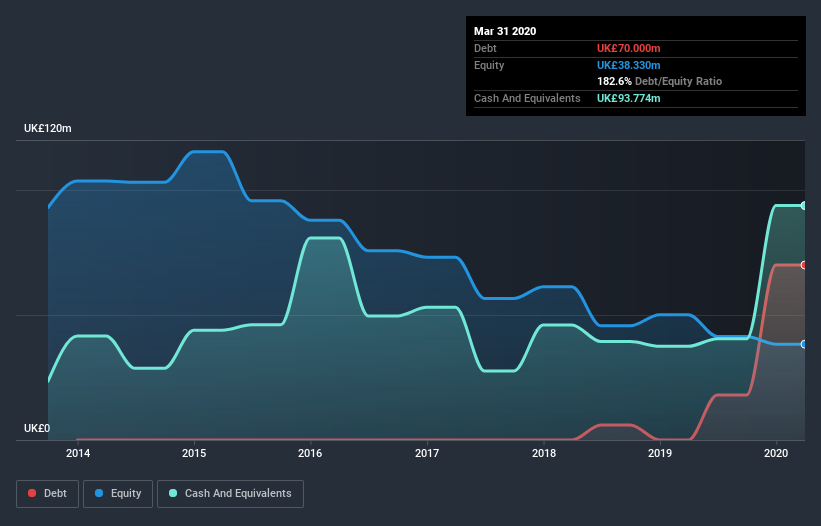Is PayPoint (LON:PAY) Using Too Much Debt?

Legendary fund manager Li Lu (who Charlie Munger backed) once said, 'The biggest investment risk is not the volatility of prices, but whether you will suffer a permanent loss of capital.' So it seems the smart money knows that debt - which is usually involved in bankruptcies - is a very important factor, when you assess how risky a company is. Importantly, PayPoint plc (LON:PAY) does carry debt. But should shareholders be worried about its use of debt?
What Risk Does Debt Bring?
Debt is a tool to help businesses grow, but if a business is incapable of paying off its lenders, then it exists at their mercy. In the worst case scenario, a company can go bankrupt if it cannot pay its creditors. However, a more common (but still painful) scenario is that it has to raise new equity capital at a low price, thus permanently diluting shareholders. Of course, the upside of debt is that it often represents cheap capital, especially when it replaces dilution in a company with the ability to reinvest at high rates of return. When we examine debt levels, we first consider both cash and debt levels, together.
Check out our latest analysis for PayPoint
What Is PayPoint's Debt?
The image below, which you can click on for greater detail, shows that at March 2020 PayPoint had debt of UK£70.0m, up from none in one year. However, it does have UK£93.8m in cash offsetting this, leading to net cash of UK£23.8m.
A Look At PayPoint's Liabilities
The latest balance sheet data shows that PayPoint had liabilities of UK£218.8m due within a year, and liabilities of UK£839.0k falling due after that. Offsetting these obligations, it had cash of UK£93.8m as well as receivables valued at UK£106.7m due within 12 months. So its liabilities total UK£19.2m more than the combination of its cash and short-term receivables.
Of course, PayPoint has a market capitalization of UK£401.2m, so these liabilities are probably manageable. But there are sufficient liabilities that we would certainly recommend shareholders continue to monitor the balance sheet, going forward. Despite its noteworthy liabilities, PayPoint boasts net cash, so it's fair to say it does not have a heavy debt load!
Fortunately, PayPoint grew its EBIT by 5.6% in the last year, making that debt load look even more manageable. The balance sheet is clearly the area to focus on when you are analysing debt. But ultimately the future profitability of the business will decide if PayPoint can strengthen its balance sheet over time. So if you want to see what the professionals think, you might find this free report on analyst profit forecasts to be interesting.
But our final consideration is also important, because a company cannot pay debt with paper profits; it needs cold hard cash. While PayPoint has net cash on its balance sheet, it's still worth taking a look at its ability to convert earnings before interest and tax (EBIT) to free cash flow, to help us understand how quickly it is building (or eroding) that cash balance. Over the last three years, PayPoint recorded free cash flow worth a fulsome 86% of its EBIT, which is stronger than we'd usually expect. That puts it in a very strong position to pay down debt.
Summing up
We could understand if investors are concerned about PayPoint's liabilities, but we can be reassured by the fact it has has net cash of UK£23.8m. The cherry on top was that in converted 86% of that EBIT to free cash flow, bringing in UK£43m. So we don't think PayPoint's use of debt is risky. The balance sheet is clearly the area to focus on when you are analysing debt. However, not all investment risk resides within the balance sheet - far from it. Take risks, for example - PayPoint has 4 warning signs (and 1 which is potentially serious) we think you should know about.
If you're interested in investing in businesses that can grow profits without the burden of debt, then check out this free list of growing businesses that have net cash on the balance sheet.
This article by Simply Wall St is general in nature. It does not constitute a recommendation to buy or sell any stock, and does not take account of your objectives, or your financial situation. We aim to bring you long-term focused analysis driven by fundamental data. Note that our analysis may not factor in the latest price-sensitive company announcements or qualitative material. Simply Wall St has no position in any stocks mentioned.
Have feedback on this article? Concerned about the content? Get in touch with us directly. Alternatively, email editorial-team@simplywallst.com.

